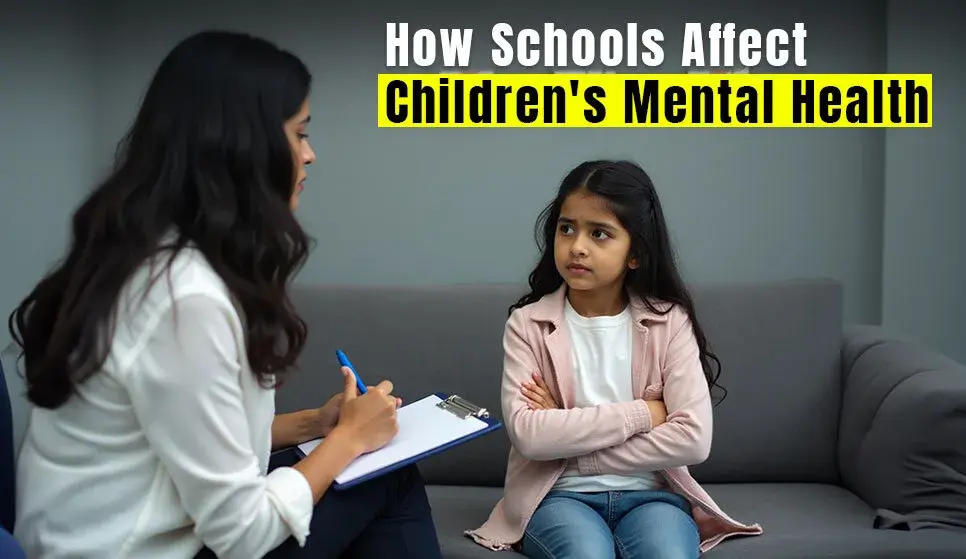Introduction:
Children spend half of their day at school, but how is it really affecting their mental health?
From exam pressure to social dynamics, school can be a source of both support and stress. As mental health issues are rising among children, it’s clear that schools play a much bigger role than just academics.
In this blog, we’ll discover how schools influence children's mental well-being and what parents and teachers can do to make that influence positive.
What Is Mental Health in Children?
Mental Health in children indicates how much mental pressure or stress kids nowadays have. It also describes that children are getting more frustrated and problematic than they used to be.
It has become crucial to understand that children these days are getting more symptoms of anxiety, depression, and stress, which can lead to bigger problems.
Why Schools Play a Central Role
Schools are a huge part of any child's life, and they affect their mental health directly or indirectly due to the amount of time that children spend in school.
Schools are structured to help children adapt to social dynamics and learning adaptability. But the race to be the best puts them under peer pressure and stress.
Whenever a student doesn’t get the answer to their question, they create a bad image of the teacher in their mind, which then creates fear in their mind.
Common Mental Health Challenges Faced by Students
Academic Pressure:
In today's society, schools have created a very competitive environment, which creates emotional problems in children.
Students get pressure from teachers and parents during the exam season, which creates stress and anxiety in their minds.
Bullying and Peer Pressure:
During colonial rule, education systems were often designed to produce clerks and administrators for the colonial bureaucracy. These systems emphasised rote memorisation, strict discipline, and standardised exams.Many schools still have bullying, which creates fear and tension in a student's mind. It also means that the schools are not using their authority correctly.
Students who get bullied face self-esteem and emotional issues, which can lead to depression in children.
Students also get peer pressure from these bullies to give them the money they have or do their homework.
Isolation and Social Anxiety
Transfered students who are introverts get socially anxious in new schools, which makes them more isolated from other students.
When children are unable to make friends in school, they feel alone and different from everyone else. This makes them doubt themselves.
How Schools Can Promote Mental Wellness
School-wide Mental Health Policies:
Schools are aiming to promote mental health policies for student well-being, including suicide prevention, by addressing the overall mental health needs of the school community.
These are key aspects of Mental Health policies:
- General prevention: Addressing factors that contribute to mental health issues, such as bullying, stress, and lack of social support.
- Strengthening teacher and staff mental health: The importance of staff well-being and providing resources for them to manage their own stress and support students effectively.
- Early intervention and support: Identifying children at risk and providing timely access to mental health services and support.
Availability of Mental Health Professionals:
One of the most critical factors in supporting students' mental health is the presence of trained mental health professionals within schools.
Many schools are severely understaffed, with some districts having only one counselor for hundreds of students. This shortage makes it difficult to address students' needs effectively or proactively.
Increasing access to qualified professionals not only helps students cope with challenges but also creates a safer, more supportive school environment where mental wellness is prioritized alongside academic success.
Role of Parents in their child’s mental health
Strengthening School-Parent Communication:
Strong communication between schools and parents is essential for supporting a child’s mental health.
When teachers and parents maintain a proper communication system, early warning signs of emotional or behavioral issues are more likely to be identified and addressed.
When parents share insights about changes at home or in behavior, educators can provide better in-school support. Building this partnership fosters trust, ensures consistency in care, and ultimately creates a more unified approach to nurturing the child’s well-being.
Exam-based learning:Mental Health Support at Home:
Supporting mental health at home starts with creating a safe, judgment-free space where children feel comfortable expressing their thoughts and emotions.
Alongside emotional support, setting healthy boundaries is equally important, especially when it comes to social media and sleep.
Excessive social media use can increase anxiety and lower self-esteem, while poor sleep habits are closely linked to mood and behavior issues.
Actionable Steps for Schools & Parents
For Schools:
Schools should appoint mental health consultants in the schools for the children. Making it easier for them to talk to someone in need.
Teachers should also normalize talking about emotions, especially in boys, so that boys can let their emotions out.
Learning Styles:For Parents:
Parents should listen to their children whenever they are asking. They should bond more with them so that the child doesn't feel shy while asking them about anything.
Parents noticing any behavioural change in their children should ask them if they feel uneasy, and if they do, then parents should consult them or hire a consultant.
Conclusion: A Shared Responsibility
Schools should always prioritize mental health to keep their students pressure-free and stress-free. They should also hire a Consultant for the needs of students.
By aligning education with a child's strengths, goals, and learning preferences, parents and educators can better prepare them for success in school, at work, and in life.It is the responsibility of the parents and teachers to make children feel comfortable and give priority to their mental health.
If you want to keep your child away from these things, then get admission for your child in the best school in Assandh. Contact VVNAssandh today.


